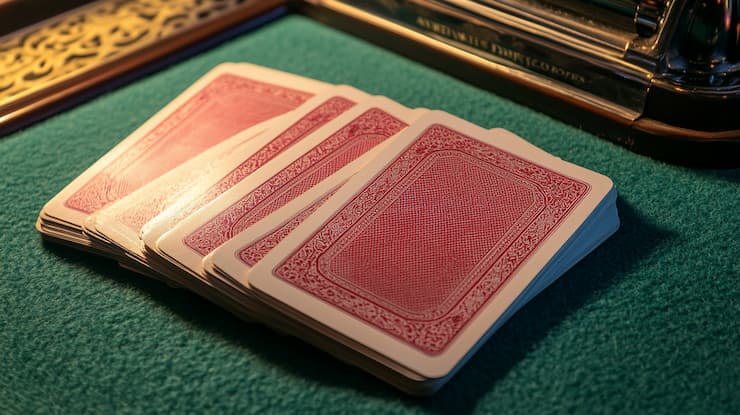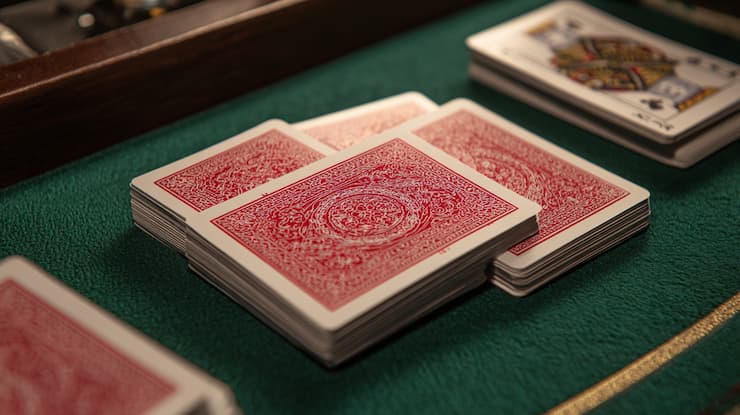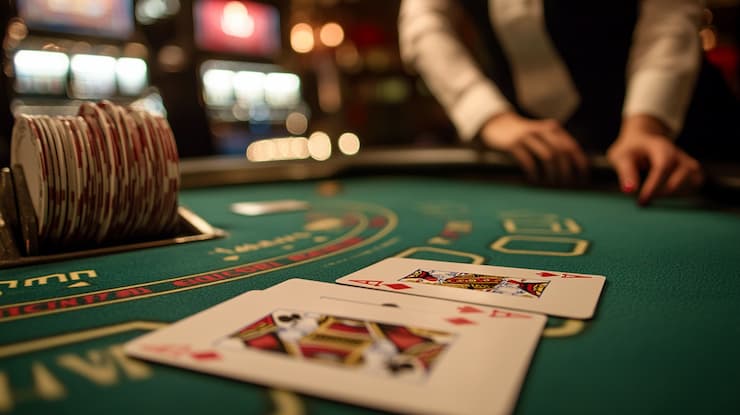How many decks are used in blackjack depends on the game format and where you play. Some versions use just one deck, while others use up to eight. The deck count impacts your odds, house edge, and how effective your strategy can be.
In this guide, we’ll explain the different deck setups used in blackjack, how they affect gameplay, and which version gives you the best shot at winning.
In This Article
- Quick Answer – How Many Decks Are Used in Blackjack?
- Standard Deck Counts by Game Type
- Casino vs. Online Blackjack Deck Usage
- Why This Matters for Your Strategy
- Single-Deck Blackjack Explained
- Odds and House Edge with One Deck
- Easier to Count Cards and Track Hands
- Downsides of Single-Deck Games
- Multi-Deck Blackjack: What to Expect
- Common Multi-Deck Formats (2, 4, 6, 8 decks)
- How Extra Decks Affect Your Odds
- Why Casinos Use Multiple Decks
- Single Deck vs Multi-Deck Blackjack: Pros and Cons
- Pros of Single-Deck Blackjack
- Cons of Single-Deck Blackjack
- Pros of Multi-Deck Blackjack
- Cons of Multi-Deck Blackjack
- How Deck Count Affects Your Strategy
- Basic Strategy Differences
- Impact on Card Counting Accuracy
- Betting Adjustments Based on Decks
- Common Myths About Blackjack Decks
- Myth: Single-Deck Games Always Have Better Odds
- Myth: Card Counting Doesn’t Work in Multi-Deck Games
- Myth: More Decks Always Mean Less Payout
- Live vs. Online Blackjack Deck Usage
- Number of Decks in Live Dealer Games
- RNG Blackjack Games and Virtual Decks
- Shuffling and Deck Penetration in Online Blackjack
- What’s the Best Blackjack Variant for You?
- New to Blackjack? Stick to Fewer Decks
- Card Counters: Choose Games Strategically
- Casual Play vs. Advantage Play
- Final Thoughts: Does Deck Count Really Matter?
- FAQs
- How many decks do casinos usually use in blackjack?
- Is blackjack 1 or 2 decks?
- How many decks are the best odds in blackjack?
- Do all casinos use the same number of decks?
- How can I tell how many decks are being used?
- Does the deck count change the blackjack payout?
Quick Answer – How Many Decks Are Used in Blackjack?
Most blackjack games use between one and eight decks, depending on the version and where you’re playing. Single-deck and double-deck games exist, but 6-deck and 8-deck blackjack are most common in casinos.
Online casino blackjack uses virtual or infinite decks, especially in RNG-based games. Knowing the deck count helps you pick games with better odds and tailor your strategy effectively.
Standard Deck Counts by Game Type
Blackjack games can use one, two, four, six, or eight decks. Single-deck and double-deck games are rare but still found in select land-based or online tables. Most gambling sites favor six or eight decks to reduce card counting and increase house edge. Some specialty games or variants may use custom formats, but these are the most common setups.
Casino vs. Online Blackjack Deck Usage
Land-based casinos usually run 6-deck or 8-deck blackjack games, with rare tables offering single or double-deck versions. In online blackjack, RNG games simulate an infinite deck, reshuffling after every hand. Live dealer games typically use 8 physical decks to mimic real casino conditions.
Why This Matters for Your Strategy
The number of decks in blackjack directly affects your odds, house edge, and approach to strategy. Fewer decks slightly improve your chances and make card counting easier. More decks increase the house edge and dilute any player advantage. Your betting system and strategic choices should always reflect the deck count in play.
Single-Deck Blackjack Explained

Single-deck blackjack uses just one 52-card deck, making it the most straightforward version of the game. You’ll usually find it in select land-based casinos or online tables labeled specifically as single-deck. Many experienced players prefer this version because it offers clearer odds and a greater chance to apply advanced strategies like card counting.
Odds and House Edge with One Deck
Single-deck blackjack typically gives you better odds than multi-deck games, assuming favorable rules. The house edge can drop to under 0.5% when blackjack pays 3:2 and the dealer stands on soft 17. Fewer cards in play slightly increase your chances of hitting strong hands or catching dealer busts.
Easier to Count Cards and Track Hands
With only one deck in play, it’s easier to keep track of which cards have been dealt. This makes card counting far more effective compared to multi-deck games. Even casual players can spot patterns or remember key cards more easily, giving them a subtle edge.
Downsides of Single-Deck Games
Despite the advantages, single-deck blackjack is harder to find and often comes with less favorable rules. Casinos may offer 6:5 payouts instead of the standard 3:2, or restrict doubling options to offset the lower house edge. These changes can cancel out the benefits, so always check the rules before you play.
Multi-Deck Blackjack: What to Expect
Multi-deck blackjack is the standard format in most offshore casinos, both online and in person. These games use anywhere from two to eight decks, with six or eight being the most common. More decks affect how the game plays, slightly shift the odds against you, and make strategies like card counting more challenging.
Common Multi-Deck Formats (2, 4, 6, 8 decks)
The most common setups include double-deck (2 decks), four-deck, six-deck, and eight-deck blackjack. Double-deck games are sometimes found in high-limit areas or online with special rules. Six-deck and eight-deck formats dominate regular casino floors and live dealer tables due to their balance of speed, control, and security.
How Extra Decks Affect Your Odds
The more decks in play, the higher the house edge becomes. For example, in a six- or eight-deck game, the odds of being dealt a natural blackjack drop slightly, and card counting becomes far less effective. Even small changes in deck count impact the probabilities behind your decisions, making basic strategy adjustments necessary.
Why Casinos Use Multiple Decks
Casinos prefer multi-deck blackjack because it makes card counting harder, allows for more continuous play, and gives them a slightly larger edge. Using more decks also lets dealers go longer between shuffles, keeping the game moving and increasing the casino’s hourly profit.
Single Deck vs Multi-Deck Blackjack: Pros and Cons
The choice between single-deck and multi-deck blackjack depends on how you play, what you value, and your overall goals. Each format has its strengths and trade-offs, so it’s important to weigh them before sitting down at a table or logging into a game.
Pros of Single-Deck Blackjack
Single-deck blackjack offers better odds when paired with favorable rules. The reduced card pool makes it easier to track dealt cards and apply strategic decisions. You’re more likely to spot patterns, and card counting becomes more effective with fewer variables in play.
Cons of Single-Deck Blackjack
These games are harder to find and often come with less player-friendly rules. Casinos may reduce the blackjack payout to 6:5 or limit doubling to increase their edge. This can wipe out the benefit of the single-deck format if you’re not careful.
Pros of Multi-Deck Blackjack
Multi-deck games are widely available both online and in casinos, making them easier to access. You’ll find more table options, side bets, and bonus features. The steady pace and shuffling systems also support smoother gameplay.
Cons of Multi-Deck Blackjack
The main downside of multi-deck blackjack is the higher house edge. More decks reduce your chances of hitting naturals and make card counting much harder. Strategic play becomes more complex, especially if you’re used to simpler, single-deck dynamics.
How Deck Count Affects Your Strategy

The number of decks used in blackjack changes how you should approach the game. From basic strategy adjustments to card counting and bet sizing, your tactics need to reflect the deck count in play.
Basic Strategy Differences
Basic blackjack strategy charts are built using probability, which shifts slightly depending on how many decks are in play. With fewer decks, certain hands become more favorable, and some moves like doubling down or splitting may offer better value.
Impact on Card Counting Accuracy
Card counting is much easier in single or double-deck games because fewer cards make the running count more accurate. In multi-deck games, the count becomes diluted and less reliable, especially with frequent shuffles.
Betting Adjustments Based on Decks
If you’re using a card counting system, your bet sizing should reflect the count and deck depth. In single-deck games, you can ramp up bets more aggressively with a favorable count. In multi-deck games, the effect of a good count is smaller, so your bet spread needs to be more conservative and methodical to avoid detection.
Common Myths About Blackjack Decks
Misunderstandings around deck count can lead to poor decisions at the table. Let’s clear up some of the most common myths about single-deck and multi-deck blackjack so you can play with confidence.
Myth: Single-Deck Games Always Have Better Odds
Single-deck blackjack can offer better odds, but only if the rules are player-friendly. Many casinos reduce the payout for a natural blackjack to 6:5 in single-deck games, which increases the house edge significantly.
Myth: Card Counting Doesn’t Work in Multi-Deck Games
Card counting still works in multi-deck blackjack, but it’s harder. You need more advanced counting systems and a deeper understanding of betting strategy to overcome the dilution effect of additional decks. With proper skill and discipline, it’s still a viable edge-play tactic.
Myth: More Decks Always Mean Less Payout
Deck count doesn’t directly change the payout structure. Blackjack payouts depend on house rules, not the number of decks. A multi-deck game that pays 3:2 with favorable rules can be better than a single-deck game with restrictive terms. Always compare the full rule set, not just the deck count.
Live vs. Online Blackjack Deck Usage
The number of decks used in blackjack changes depending on whether you’re playing live dealer games or RNG-based online versions. These formats handle deck usage differently, and that affects both strategy and player expectations.
Number of Decks in Live Dealer Games
Live dealer blackjack typically uses six or eight physical decks, just like in a traditional land-based casino. The dealer shuffles manually or uses a shoe, and rules are clearly displayed.
This setup gives you an authentic experience and makes it possible to apply real-world strategies, though card counting is still challenging due to limited penetration and frequent shuffling.
RNG Blackjack Games and Virtual Decks
Random Number Generator (RNG) blackjack games often simulate infinite decks by reshuffling after every hand. These virtual games don’t rely on physical cards, so you can’t track previous outcomes or count cards. They’re designed for speed and fairness but offer no advantage to strategic players beyond basic strategy.
Shuffling and Deck Penetration in Online Blackjack
In live dealer blackjack, the game usually continues until around 50–70% of the shoe is dealt, then it’s shuffled. This is known as deck penetration and matters for card counting. In contrast, RNG blackjack reshuffles after every hand, making penetration irrelevant and eliminating any chance to use advanced strategies like counting.
What’s the Best Blackjack Variant for You?
Choosing the right blackjack game depends on your experience, goals, and how you like to play. Some versions favor simplicity and lower risk, while others offer more challenge or long-term edge potential. Matching the deck count to your play style can make all the difference.
New to Blackjack? Stick to Fewer Decks
If you’re just starting out, single-deck or double-deck blackjack can be a great choice. Fewer cards mean fewer variables, making it easier to learn and apply basic strategy. You’ll face simpler decisions and clearer odds, which helps build confidence at the table.
Card Counters: Choose Games Strategically
For card counters, deck count and penetration are critical. Single-deck games offer the clearest edge but are often paired with harsh rules. Look for double-deck or six-deck games with favorable rules and deep penetration. Avoid tables with automatic shufflers or frequent reshuffles.
Casual Play vs. Advantage Play
If you’re playing for fun, multi-deck blackjack offers more table options, side bets, and bonuses. It’s ideal for casual sessions without worrying about odds. If your goal is long-term profit or strategic mastery, focus on games with fewer decks and rules that let you capitalize on skill-based play.
Final Thoughts: Does Deck Count Really Matter?
Deck count plays a key role in how blackjack is played and how much edge you can gain or lose. Fewer decks generally give you better odds and more control over your strategy, especially if you’re counting cards.
More decks mean a higher house edge and less predictability. While deck count alone doesn’t guarantee better outcomes, knowing how it impacts the game helps you choose smarter tables and play with more intention.
FAQs
How many decks do casinos usually use in blackjack?
Is blackjack 1 or 2 decks?
How many decks are the best odds in blackjack?
Do all casinos use the same number of decks?
How can I tell how many decks are being used?
Does the deck count change the blackjack payout?

